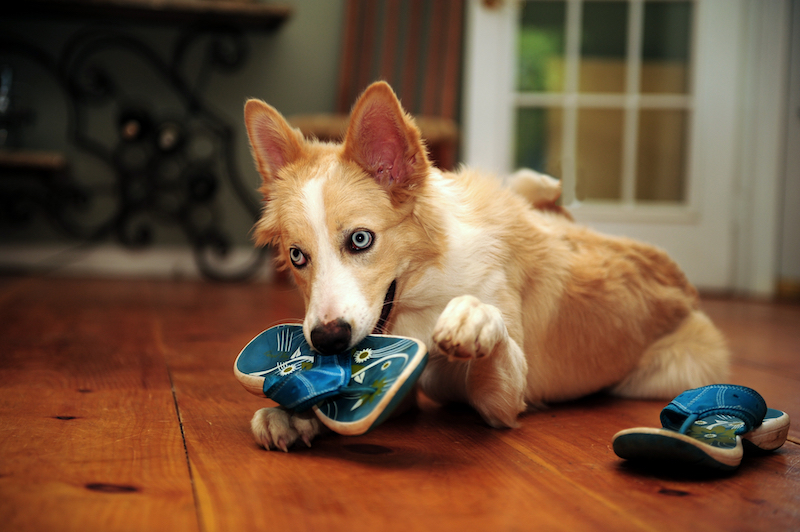Puppies chew. There is no way around it, but the reasons why they chew vary, and consequently, require varied solutions. If your puppy chews, it is advisable to rule out a few of the potential reasons behind the chewing behavior.
Your dog may be chewing as a result of separation anxiety, and may exhibit chewing behavior when left alone. The chewing will generally be accompanied by barking, whining, and overall restlessness, and even untimely urination or bowl movements. If it is suspected that separation anxiety is the root cause, please read our article on separation anxiety.
If your puppy was weaned early (before eight weeks of age), the chewing presents itself in the form of sucking on fabrics. This behavior may require intervention by a professional behavior therapist or animal trainer, especially if the puppy is showing signs of compulsive fabric sucking (e.g. is not distracted by anything when engaging in this behavior).
You may also need to figure out whether your dog is simply hungry, and is just chewing on objects in search of food. If you notice that the chewing is done on objects food containers, or other objects which the dog deems as food related. Things that smell like foodstuff will be especially attractive in this case. There is, of course, and easy solution to this particular chewing problem; simply increase the amount of food until the behavior stops.
Common Reasons for Chewing
As mentioned earlier, dogs and puppies chew; chewing is normal behavior, but the reasons for chewing can be different.
Teething Puppies: Like human babies, as puppies teeth, they relieve the pain and itching sensation by chewing on most things they can get their paws on. If your puppy is younger than six or seven months old, and is exhibiting chewing behavior, it is highly likely that is simply due to teething. To help your puppy along, and save your furniture and shoes, you can provide other things of interest for your puppy to chew on. Items can include special toys designed to keep them entertained for a good while, frozen washcloths (wet them first), or cold icy treats can help ease the pain while they are teething.
Run of the Mill Chewing: Chewing has beneficial effects for dogs, and whether they are in the wild or in a domestic environment, they’ll happily chew on bones or other objects for hours, helping strengthen their jaws, and keeping their teeth clean. You should only be concerned if the chewing is excessive, or is directed towards inappropriate items, like your dining chair legs. There are steps you can take to help your canine pal continue with one of his favorite activities, while not destroying your house.
Keep Objects Away: Don’t give your dog the chance to get access to things you absolutely do not want them playing with, and don’t let them continue chewing on things they have already destroyed (like shoes), this will simply teach them that chewing on that type of item is not frowned upon.
Provide Dog Toys & Chewables: Give your dog his own toys. They don’t have to be store-bought, but they also can’t be objects from around the house, as he’ll assume that any similar object is ok the chew on. Keep their attention by switching out toys from time-to-time. You can also provide other items for your dog to chew on such as antlers, rawhide, and raw bones.
Distractions During Peak Chewing Times: If you notice the chewing behavior manifest itself during specific times of the day, make sure to provide some type of distraction for him during those time, such as giving him something acceptable to chew on.
Deterrents: If possible spray furniture or objects with deterrents (available at most pet, and supermarkets). Follow instructions provided by the product.
Supervision & Prevention: When your dog is with you, pay close attention to his behavior and catch them right as they are about to start chewing on something and discourage the behavior, or distract them with something else he can chew on. When you are not around or cannot closely supervise him, it is advisable to confine him to an area where there is not anything for him to chew on. Of course, provide appropriate chew toys for him with which he can occupy himself.
Exercise & Stimulation: Exercise and activities can solve a lot of canine behavioral issues, and chewing is no different. If you keep your dog mentally and physically challenged, it is far less likely that he will resort to occupying himself by chewing on things he shouldn’t.
Please keep in mind that punishing your dog, after the fact, in any way or form will not help solve the problem, as he cannot make the connection between something he did minutes ago, and the punishment being handed out.

